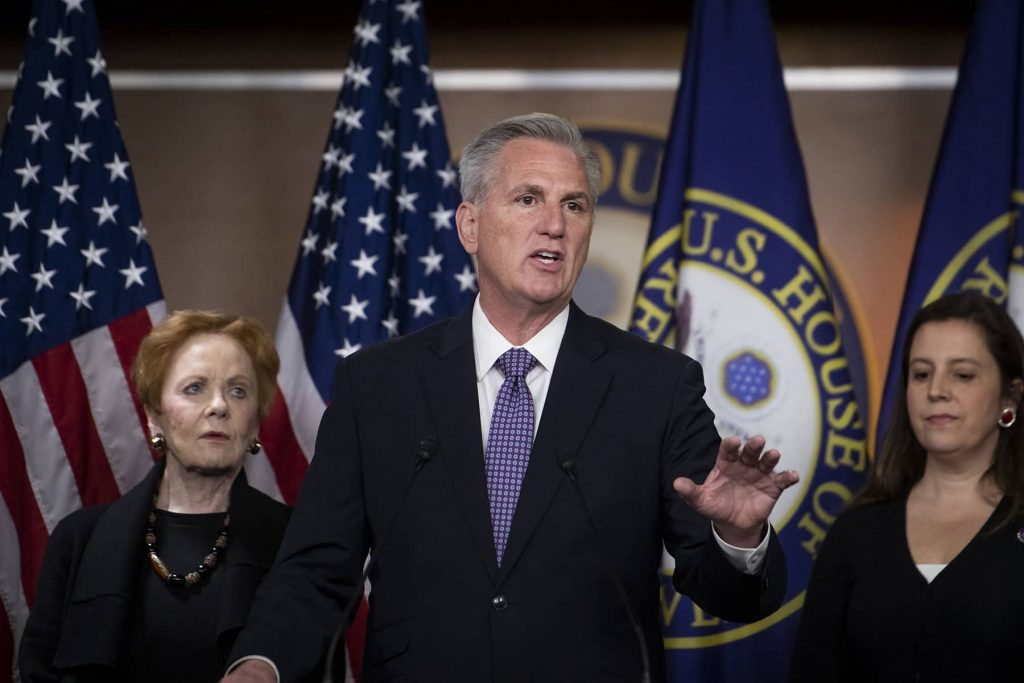The 2022 Congressional elections surprised virtually everyone. Until late September, the Republicans expected to take the House with a sizable majority. Perhaps it would not be the 60-plus advantage they anticipated earlier in the year, but still one in excess of twenty seats. Instead, when the 118th Congress convenes on January 3, the Republicans will hold a mere nine-seat majority. As a result, the 30 members of the far right Patriot Caucus will have the whip-hand over the next house speaker. Currently, House Minority Leader Kevin McCarthy from California is the presumptive House speaker, but he faces a serious challenge from his right.
>> Window on Washington: Read more from Dov S. Zakheim
The Republicans have only a 222 to 213 majority in the House of Representatives, with 218 votes needed to be elected speaker. McCarthy can only afford to lose four votes and the last thing he would want is to have Democratic votes putting him over the top. Rep. Andy Biggs of Arizona, a member of the Patriot Caucus, has announced he will challenge McCarthy and three other members of Congress have already announced they will not support McCarthy, with several others expressing skepticism about his leadership potential. It will be a very close call for the California congressman.
To shore up his chances and ensure that the straw poll that he won easily over Biggs by a 133 to 81 margin was not an aberration, McCarthy has lined up both Donald Trump and the far right-wing icon Marjorie Taylor Greene in his corner. Trump reportedly has been phoning individual members of Congress, telling them to support “my Kevin.” Greene, whose favorite sport is making waves of the most outrageous kind, has vocally supported McCarthy, stating that “It’s very, very risky . . . to produce a leadership challenge, especially for speaker of the House.” Interestingly, her sometime fellow traveler, Congressman Matt Gaetz, is one of the four who have made it clear that they will not support McCarthy.
To ensure Greene’s support, McCarthy appears to have promised to not only restore her to House committees from which she was removed by the Democrats but also to award her the chair of the House Oversight Committee. In that role she could launch investigations into Hunter Biden, among others. McCarthy has also announced that he will remove Greene’s arch opponent, the antisemitic Minnesota Representative Ilhan Omar, from her committee assignments. Finally, he has remained silent in the face of Greene’s incendiary claim that “if Steve Bannon and I had organized that [the January 6 insurrection], we would have won… Not to mention, it would’ve been armed.”

To win over most of the Patriot Caucus, McCarthy has also promised to support an investigation of the Afghanistan fiasco, as well as to terminate the work of the January 6 committee. He has demanded that the committee preserve all records and transcripts and has promised that the Republican-led House will hold hearings next year on the security failures that led to the riots on that day. Just as he has remained silent in the face of Greene’s pronouncements, McCarthy has also refused to criticize Donald Trump for hosting the antisemites Kanye West and Nick Fuentes for dinner at his Mar-a-Lago home.
In the Senate, Democrats were able to improve their position (from a 50–50 tie that the vice president can break as the Senate’s presiding officer) to a more comfortable 51–49 majority. Vice President Kamala Harris is thus no longer on call to break any Senate tie-vote. Not all Democrats were surprised by the outcome; a senior Democratic senator told me some weeks before November 3 that the most likely outcome of the election would give his party a 51–49 majority,
Perhaps the most jarring setback for the Republicans was Senator Rafael Warnock’s defeat of Herschel Walker and his election to a full Senate term. Trump had urged Walker to run, but Walker was in equal parts inarticulate and uninformed. Moreover, despite arguing that he was the family values and anti-abortion candidate, Walker’s personal baggage included allegations that he had pressured girlfriends to undergo abortions and had fathered several children out of wedlock.
The Warnock victory gave the Democrats their 51st Senate seat, though not long after, Senator Kristen Sinema of Arizona announced that she was leaving the Democratic Party. Nevertheless, Senate Majority Leader Chuck Schumer wisely decided to let her keep her committee posts and left the door open for her to caucus with the Democrats, which most observers believe she will.
The biggest loser in the election was Donald Trump. The candidates he supported lost five of six elections, of which the most notable was Walker’s loss. At the same time, Georgia Governor Brian Kemp and Secretary of State Brad Raffensperger, both having refused Trump’s pressure to reverse the outcome of the Georgia presidential vote in 2020, easily won reelection.
Trump has announced that he is running for president in 2024. Yet his fortunes have continued to decline since that announcement. His most serious rival for the Republican nomination, Florida Governor Ron DeSantis, is now running neck-and-neck with Trump in polls of Republicans likely to vote in 2024. DeSantis won his own reelection by a huge margin, garnering over 60% of the vote and winning in previously solid Democratic precincts throughout the state.
Trump is also losing ground with America’s largest political group, independents. Many supported him in 2016, but they appear to be tired of his antics, his narcissism, and his refusal to concede an election that is now two years in the past.
Trump is his party’s albatross. Few Republicans are prepared to challenge him openly, among them DeSantis, who—despite amassing a huge electoral war chest—has yet to declare that he actually will seek the 2024 Republican nomination for president. Nevertheless, an increasing number of leading Republican politicians and operatives privately whisper that they simply wish Trump would go away.
Trump, being Trump, is unlikely to do so. At some point, DeSantis or some other potential Republican candidate will have to challenge him openly. And at that point, Trump may find that he has worn out his welcome with a party that he joined only a few years before he won its nomination in 2016.



